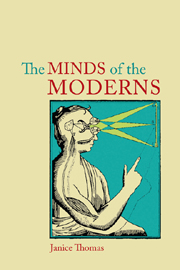Book contents
- Frontmatter
- Contents
- Acknowledgements
- Abbreviations
- Introduction
- I Descartes
- II Spinoza
- III Leibniz
- IV Locke
- 16 Is the mind a substance for Locke?
- 17 Locke's views on self-knowledge
- 18 Locke on consciousness
- 19 Locke on mental causation
- 20 Locke on representation
- V Berkeley
- VI Hume
- Conclusion
- Bibliography
- Index
17 - Locke's views on self-knowledge
from IV - Locke
- Frontmatter
- Contents
- Acknowledgements
- Abbreviations
- Introduction
- I Descartes
- II Spinoza
- III Leibniz
- IV Locke
- 16 Is the mind a substance for Locke?
- 17 Locke's views on self-knowledge
- 18 Locke on consciousness
- 19 Locke on mental causation
- 20 Locke on representation
- V Berkeley
- VI Hume
- Conclusion
- Bibliography
- Index
Summary
Locke's conviction that human minds are not furnished with any innate knowledge but that all our ideas come from sensation and reflection alone was noted in Chapter 16. Now we need to ask what impact this empiricism has on Locke's views about the knowledge we have of ourselves. From sensation we mostly obtain ideas about the world outside ourselves, although we clearly also gain some ideas about our bodies, particularly the extremities, from our external senses. (Think, for example, of discovering that you have a rash on your hand by seeing it before you feel it.) But when it comes to learning about our own minds, Locke, like Leibniz and Berkeley, thinks that we rely on reflection – a kind of turning inwards of the mind on itself – as a dedicated source of information about our mental life and inner, subjective self. In this chapter I shall look at the two sorts of knowledge of self we might hope to have from reflection: first, knowledge of our existence and essential nature as minds or spirits; and, secondly, knowledge of what is going on in our minds. In the last section I shall look at Locke's rejection of the Cartesian doctrine that the mind is always thinking and then, in Chapter 18, I shall go on to discuss Locke's views on the nature of human consciousness and subjectivity.
- Type
- Chapter
- Information
- The Minds of the ModernsRationalism, Empiricism and Philosophy of Mind, pp. 148 - 154Publisher: Acumen PublishingPrint publication year: 2009

